Mushrooms: Nature’s Miniature Pharmaceutical Factories
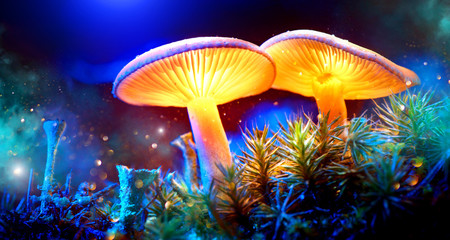
By Debra Mastrianna
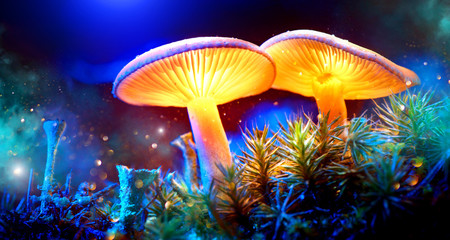
Mushrooms have evolved through the ages to survive their own predators. So, it is no coincidence that, prior to the pharmaceutical age, we used plants and fungi to survive the diseases that plagued us and to help humans reproduce and flourish. Mushrooms act as a booster for our immune system and help alleviate stress and inflammation.
A rare variant of dirt, mycelium, found naturally in mushroom field biomes, constantly releases tiny spores from the surface. Surrounded by hundreds of millions of hungry microbes, mushrooms use this capability to keep predators at bay. Not unlike medicines that come from botanicals, many of the chemicals that fungi produce to flourish in the wild are also active in humans. And phylogenetically, the animal kingdom is more closely related to mushrooms than it is to plant life. This foundation of the humble mushroom’s relationship with microbes also creates medicinal value for humans.
While the medicinal health benefits are many, each variety of mushroom is unique and provides its own distinct health advantages. Because practical use of mushrooms is still new to Western medicine, much more research is needed to explore the vast array of possible applications. Here are a few varieties that offer distinct benefits and uses.
Chaga-The Antioxidant Powerhouse
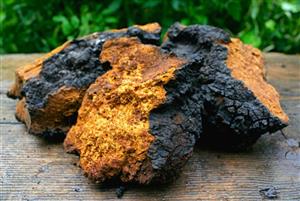
Chaga mushrooms are an antioxidant powerhouse that grow on birch trees throughout the northern hemisphere and resemble a dark clump of dirt distinguished from other growths by their bright orange tissue.
Chaga may help regulate the production of the chemical protein messengers, cytokines. These proteins play a vital role in stimulating white blood cells that defend our immune system. Recent research suggests that some conditions, including depression and autoimmune conditions, that are not normally considered inflammatory, may be partially attributed to chronic inflammation.
This nutrient-dense oxidizing superfood is rich in a wide variety of vitamins, minerals, and nutrients, including: B-complex vitamins, vitamin D, potassium, rubidium, cesium, amino acids, fiber, copper, selenium, zinc, iron, manganese, magnesium, calcium, and has been found to lower bad cholesterol. The Chaga mushroom can fight against free radicals, inflammation, aging skin caused by oxidative stress and inflammation related to chronic conditions such as rheumatoid arthritis.
Cordyceps For Get Up and Go
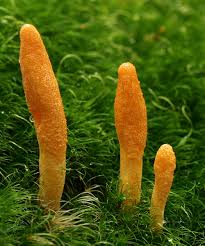
Cordyceps has been used for centuries in Traditional Chinese Medicine (TCM) to support general well-being and health. But Cordyceps, which contains more than 16 kinds of essential amino acids and 15 trace elements, is actually not a mushroom at all. It was originally believed to be “magical” by the Chinese and has been used traditionally, in both China and Tibet. The benefits of this fungus sometimes referred to as Caterpillar fungus, or Cordyceps mushroom, are impressive.
Known as a resource for stimulating both energy and libido, Cordyceps can improve exercise and athletic performance, but also speed up post-workout muscle recovery. The fungus is popular, as well, among elderly patients who are suffering from fatigue, shortness of breath and senility related symptoms.
Cordyceps has also been found to have antioxidant properties that have been established in scientific studies to protect the body against free radical scavengers. For this reason, the function of cellular immunity, humoral immunity and natural killer cells may be enhanced by Cordyceps. It can also provide a powerful concentration of anti-aging compounds known to help rejuvenate skin and improve blemishes, age spots, and wrinkles.
This natural fungus has been widely used to ease the effects of renal failure, renal dysfunction, nephropyelitis, nephrotic syndrome, diabetic nephropathy, gouty nephropathy and many other kidney disorders.
Lion’s Mane– Serious Brain Food

Hericium erinaceous (Lion’s Mane, yamabushitake, or bearded tooth carpophore) grows on old or dead broadleaf trees, and is used as both food and medicine in parts of Asia. Lion’s Mane is a rare species, because it fosters the production of the bio protein nerve growth factor and myelin (an insulation around nerve fibers).
In Chinese and Japanese medical systems, it has traditionally been used to fortify the spleen and nourish the gut. Lion’s Mane is said to be nutritive to the five internal organs, liver, lung, spleen, heart, and kidney, and promotes good digestion, general vigor, and strength. It is also recommended for gastric and duodenal ulcers.
The mushroom is also known for its effects on the central nervous system, and is used for insomnia, vacuity (weakness), and hypodynamia, which are characteristic symptoms of Qi deficiency, the life force that drives every activity in organic life forms according to Traditional Chinese medicine.
Lion’s Mane is full of antioxidants that strengthen the immune system, including both NFG and myelin, and are crucial for a healthy brain. An imbalance can contribute to neurological diseases such as Alzheimer’s and multiple sclerosis and effect cognition in anxiety and irritability.
Maitake– King of Mushrooms
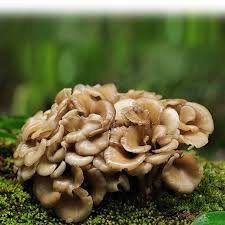
Maitake has been described as the “King of Mushrooms” in Japan and it is rapidly gaining a reputation as one of the finest immuno-stimulants known. For over three thousand years, the mushroom has been used in Traditional Eastern medicine, but new scientific research in Japan and the United States has discovered some powerful compounds that have shown significant carcinogenesis prevention activity in tests. Maitake has been widely used to help maintain a healthy weight, due to its ability to lower triglycerides, lipids, phospholipids, and cholesterol. It is also used to regulate blood pressure, control stress reduction, bacterial immunity, chronic fatigue syndrome, chronic hepatitis, rheumatoid arthritis, constipation, tumors, liver, prostate, and colon and breast health. It has also been promoted for hair loss, pain, side effects of anti-cancer drugs and nausea. Maitake mushroom tinctures have been found to be especially beneficial for HSV-1 and HSV-2 because it prevents stress-induced outbreaks.
A study published in 2004 issue of the “Journal of Medicinal Food” found that the D-fraction, a polysaccharide, and Beta glucan, found in Maitake mushrooms, activated several types of immune cells, including T-helper cells, macrophages, and interleukins. A potent compound found in the mushroom has also been shown to prevent carcinogenesis and further studies are investigating the potential use of Maitake for malignant colorectal and breast disease. It has been approved by U.S.F.D.A. in clinical studies of Maitake for participants with advanced prostate cancer, skipping the usual first-phase toxicity study, going directly to phase-two human study.
New research has claimed that Maitake Mushroom may be useful for treating hypertension, and there are reports that Maitake can lower blood pressure, increasing the body’s ability to recognize glucose levels and improve the insulin levels. This effect is especially useful for those people with hypoglycemia and diabetes.
What makes Maitake mushrooms so unique is the fact that they are also rich in minerals such as calcium, phosphorus, potassium, and magnesium and vitamins B2, D2 and niacin. So if you are looking for a way to feel better, improve body functions, strengthen your heart and increase immunity, Maitake mushroom extract may be a perfect solution.
Red Reishi-Boost Your Mood
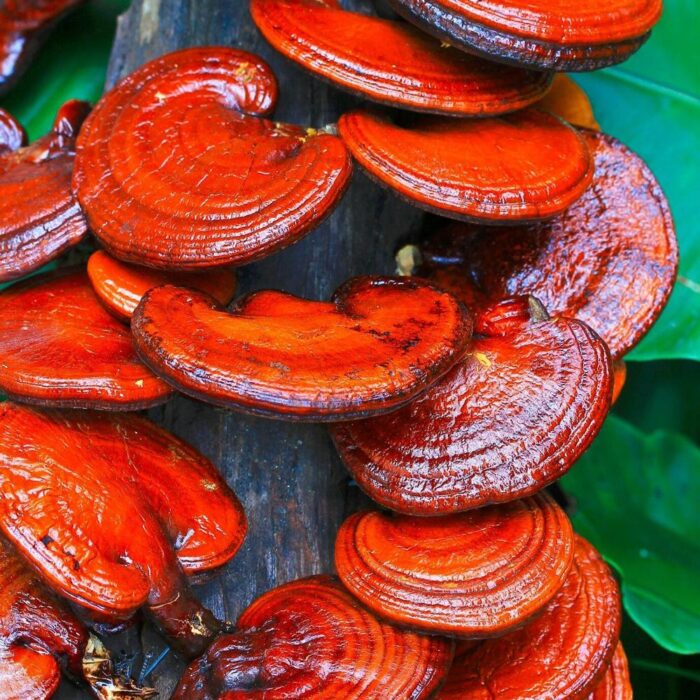
Red Reishi is one of the most popular medicinal mushrooms, because of its multi-dimensional abilities, among traditional Chinese medicine. Reishi can do it all, from mental well-being and immune strength, to weight loss,
Reishi mushrooms are regarded by the Chinese as the “Medicine of Kings” in the “Great Pharmacopoeia”. The mushrooms have been used traditionally by herbalists for insomnia as well as psychiatric and neurological conditions. In China, the Reishi mushroom is used as a muscle relaxant and for pain relief. For centuries, the Reishi mushroom has been used as a cardio tonic herb and was prescribed routinely for those with symptoms consistent with both stress and/or coronary artery disease-related angina. Recently, in Russia, scientists found that Reishi showed a significant preventive and therapeutic action against plaque build-up. Research has also shown that the Reishi extract significantly inhibits anti-allergy action for allergic reactions, and has shown positive effects on asthma and contact dermatitis as well as other inflammatory conditions.
Reishi is believed to help the body maintain balance. And in laboratory research, this mushroom has shown that the polysaccharide beta-1, 3-D-glucan in Reishi extracts help boost the immune system by raising T-cell levels. This has major implications for those who are suffering from AIDS and other immune disorders.
The bitterness of Reishi mushroom, derived from triterpenes, promotes liver function. It has been used in alternative treatments for hepatitis B, jaundice and liver fibrosis, the final stage of a non-alcoholic fatty liver disease. It also appears to have the ability to alleviate plasma insulin levels, and enhance liver’s ability to metabolize glucose. Reishi is best taken in the morning on an empty stomach with ample water, to enhance the effects of the Reishi and rid the body of poisonous waste
As an ingredient in skin care, Red Reishi mushroom liquid extract may contribute to the youthful appearance and overall function of your skin. Anti-allergenic and anti-inflammatory properties help regulate the immune and circulatory system. Because of this, mushroom extracts are used in Chinese medicine to help reduce skin’s inflammation, puffiness, and wrinkles, reducing destruction caused by free radicals and promoting cell regeneration to increase skin thickness and texture. It has also been used to treat external skin problems such as skin wounds, scrapes, insect bites and stings, mouth ulcers, psoriasis, external bleeding, sunburn, and rashes.
Shiitake– Keep Chronic Ailments at Bay
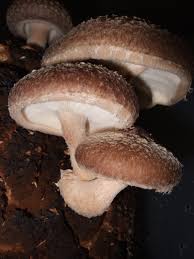
Shiitake Mushrooms, are well known as a great way to improve your health and stimulate your immune system. It has been used to build resistance against viruses, infection, the common cold and macular degeneration, and may be useful when addressing autoimmune disorders, heart function and bad cholesterol.
In lab tests, the alkaloid in this mushroom was said to reduce the total cholesterol levels by twenty-five percent in one week, and the effect was more pronounced in subjects who ate high-fat diets than in those on low-fat diets. Shiitake accelerates the accumulation of LDL in the liver, where it is then converted in HDL or good cholesterol. Shiitake is also said to promote normal blood pressure levels.
At Penn State, researchers acknowledged that all mushrooms are a rich source of powerful antioxidants, but the exotic mushrooms, such as Shiitake, contain more, providing cellular protection within the human body that can help reduce the risk of developing chronic diseases. Research has also claimed that Shiitake Mushroom may prolong the survival rate or possibly lower the discomforts and/or damage associated with chemotherapy. Additionally, it may improve the quality of life, providing substantial relief to patients who have undergone such therapy.
Shitakes are particularly good for the heart and have been shown to lower LDL in mice, as they contain compounds that inhibit the absorption and production of cholesterol in the liver. They also contain phytonutrients, which aid in preventing plaque buildup and maintain healthy blood pressure and circulation.
Disclaimer: The information presented herein is intended for educational purposes only. These statements have not been evaluated by the FDA and are not intended to diagnose, cure, treat or prevent disease. Individual results may vary, and before using any supplements, it is always advisable to consult with your own healthcare provider.
Tags: chaga, chronic, cordyceps, disease, immune, lion's mane, maitake, mushroom, red reishi, reishi, shitake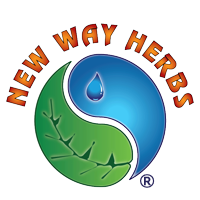
Comments are closed here.